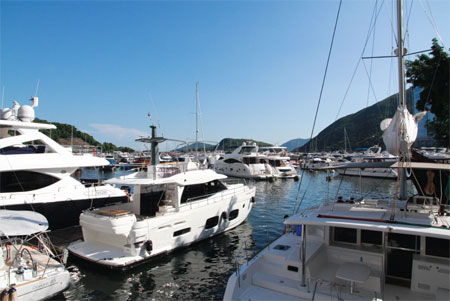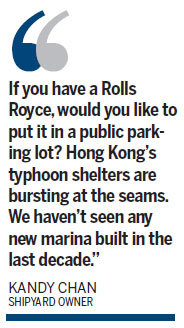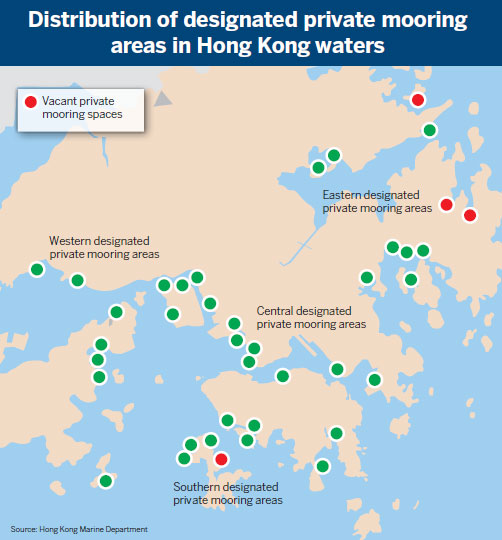Nowhere to anchor
Updated: 2014-11-14 07:09
By Selena Li(China Daily USA)
|
||||||||


Hong Kong's marked growth in the yachting industry, fueled largely by the property boom, has led to a drastic shortage of berthing facilities, particularly for pleasure boats. Selena Li reports.
Palls of clouds dimmed the sky on the second day at this year's Hong Kong Gold Coast Boat Show at Castle Peak Bay, Tuen Mun, which featured a bevy of luxury streamlined, foreign-manufactured boats.
Flashing a warm smile, Joe Yuen - a yacht broker who has been on the job for 10 years - greeted patrons as he took pains introducing the nautical characteristics of a second-hand yacht on display.
But, like his peers in the field, he finds that times have changed and the current business climate hard to swallow, and anchoring a deal seems a distant task.
"As far as sales (of yachts) are concerned, you may have a client who's just enquiring about purchasing and owning a yacht. But when you cannot offer him a marina berth or a mooring space, then they'll have no option left, but to make an immediate about-turn," Yuen lamented with a big sigh.
An acute shortage of marina spaces has dampened this year's boat shows, seriously constraining the yachting industry of Hong Kong which, with a natural harbor that's been an envy of the world, propels one of the most developed and mature boating markets in Asia.
According to data from Hong Kong Marine Department, the city had more than 17,000 licensed boats last year, 8,491 of which were yachts primarily used for leisure, recreation and sports. There are currently only 10 privately-developed marinas that are located at a dozen yacht clubs. Club membership costs anything from HK$1 million to HK$4 million, along with a monthly berthing fee that varies according to the size and length of the vessel.
"It costs HK$80,000 a month to put this 16-foot vessel here at the Aberdeen Boat Club. And the berthing rates have kept soaring by 10 percent annually for the past three or four years," said Yuen.
And, just like any of the elite clubs around Hong Kong, having the money doesn't promise immediate admission - you have to queue up along with the others, including tycoons, business and professional people.
"For those intending to buy their way into a yacht club, they have to wait until a vacancy crops up ... it could be years queuing up for a berthing space and there's no guarantee," said Eric Chan, a senior broker at Simpson Marine.
Lust for pleasure life
Hong Kong saw a marked growth of 7 percent in the city's yachting industry in 2004 and 2005, in the aftermath of the SARS (Severe Acute Respiratory Syndrome) epidemic, as a buoyant economy a decade ago fueled the lust of people in search of the pleasure life - chasing luxury goods and hobbies, such as yachting.
"The property boom was one big factor, with real-estate developers willing to fork out top dollars for the most glamorous vessels," said Chan. "Doctors, lawyers and small businessmen joined in, showing great interest in relatively small yachts," he said, adding that Hong Kong has remained a prime venue for yachting in Asia.
But, wealthy people are now feeling the pinch from a dearth of berthing facilities. For small boat owners, other than anchoring their vessels in yacht clubs, they have to turn to sheltered anchorages or the Marine Department's private mooring areas as a last resort.
According to Southern District councilor Paul Zimmerman, who's also a member of the Harbourfront Commission, public moorings like those in typhoon shelters are primarily designed for bigger vessels, and they are not always situated close to the waters used for recreation or easily accessible over land. Sublet moorings are rented at inflated prices, particularly during the typhoon season when shelters are packed with fishing boats and cargo ships. Thus, it's not a sound place to anchor a million-dollar yacht.
Kandy Chan, owner of Sing Sing shipyard, drew a comparison: "If you have a Rolls Royce, would you like to put it in a public parking lot?"
"Hong Kong's typhoon shelters are bursting at the seams, and we haven't seen any new marina built in the past decade. This will certainly give rise to problems in our business," groaned Chan.
The boating industry also involves shipbuilding, repairing and catering. When people spend money on super boats, the multiplier effect is enormous. A crew team for a large yacht would mean jobs for four or six people.
The Marine Department's private moorings, which cost HK$2,000 per vessel a month, may seem to fill the gap between the options on the table. However, out of the 1,900 moorings scattered around Hong Kong's islands, only about 30 of them are available.
Race for marinas
Other cities in the region, such as Macao and Singapore, are developing their marinas at a breakneck pace. The tourist resort of Sanya in Hainan province has vowed to build more than 8,000 yacht berths by 2020.
Hong Kong's Marine Department maintained that the government's policy is to ensure that local vessels and small visiting vessels can find suitable sheltered space during the passage of typhoons. This means that, under normal circumstances, except in areas where anchoring is prohibited, coxswains and owners of local vessels may anchor their vessels at any safe and suitable area in Hong Kong waters.
"The Marine Department is in charge of marine safety and marine traffic. It's not concerned with providing berthing spaces for boats or facilities on land for the use of boats," Zimmerman said.
"It also has nothing to do with the Planning Department, which deals only with land and not anything that's related to marine issues. So, there's this big gap within the government," he added.
However, as part of overall efforts to alleviate the problem, the Marine Department has commissioned a review of berthing and sheltered spaces for local vessels. A consultant company has been invited to conduct the first part of the review, taking stock of existing berths and mooring spaces and studying market demand. The entire program is expected to be completed by mid-2015.
"The government will need to work hard to promote the purpose and objectives of the study, and confidentiality of the information," Zimmerman urged.
But, he's worried that as the researchers will contact registered vessel owners, the owners may not want to respond in full depending on the status of their anchorage or mooring.
Contact the writer at selena@chinadailyhk.com




 First ladies cuddle up to koalas
First ladies cuddle up to koalas
 90's generations girls strive for their artistic future
90's generations girls strive for their artistic future
 UAVs displayed at Zhuhai air show
UAVs displayed at Zhuhai air show
 China launches new remote sensing satellite
China launches new remote sensing satellite
 China army medics join Ebola battle
China army medics join Ebola battle
 Small e-commerce business owners dream big
Small e-commerce business owners dream big
 Baby steps for nation in its golf infancy
Baby steps for nation in its golf infancy
 Across Canada Nov 14
Across Canada Nov 14
Most Viewed
Editor's Picks

|

|

|

|

|

|
Today's Top News
Progress eyed in building new Sino-US relations
'Thousands stand to benefit' from visa accord
Xi starts busy schedule with G20
China army medics join Ebola battle
Chinese tourists look west
US spying scheme targets Americans' cellphones
Energy tops deals with Myanmar
The Waldorf's hefty price tag
US Weekly

|

|







